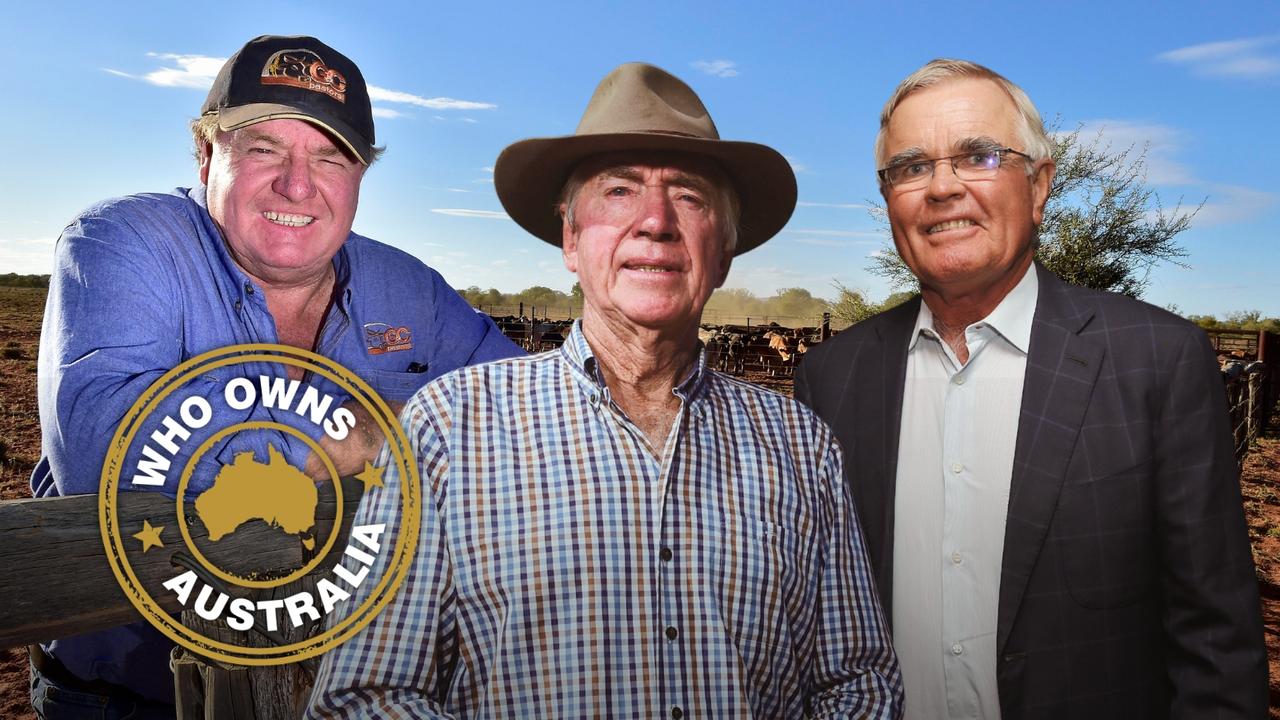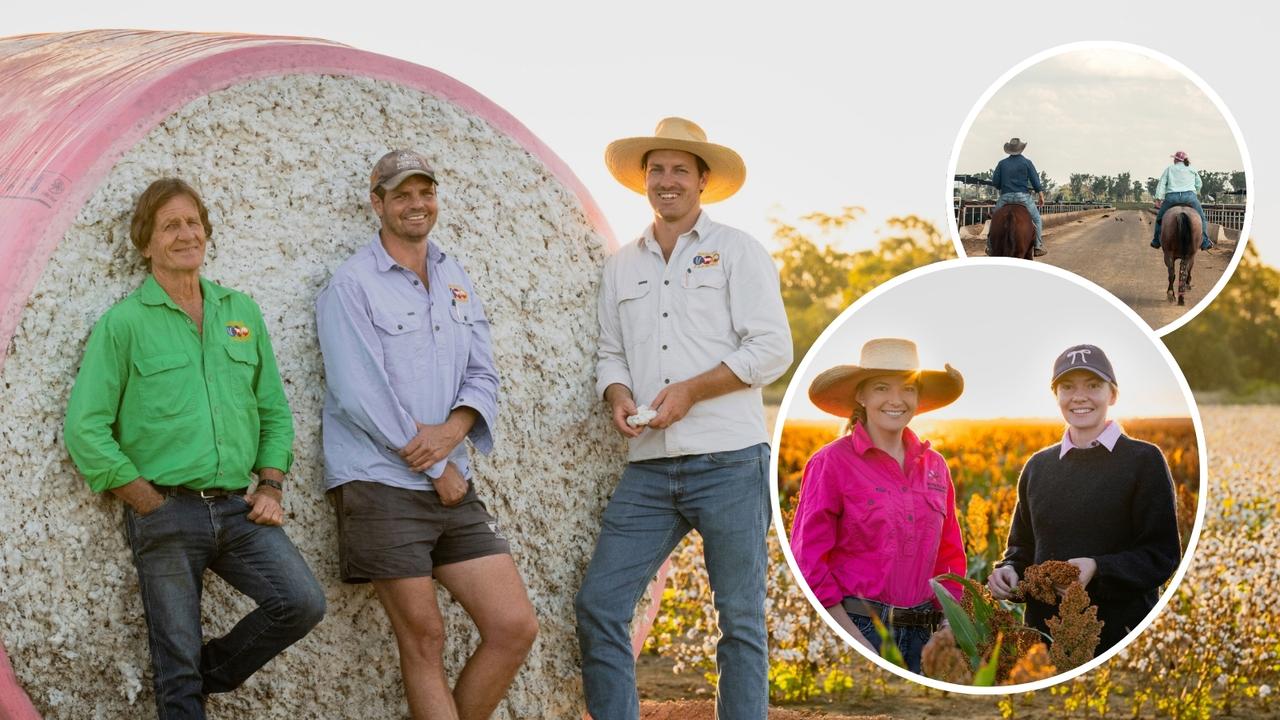Fiona Simson: What the NFF’s first female president will do next
As leader of ag’s most powerful lobby Fiona Simson has set an ambitious agenda, and changed the way Australians view farmers. Now she’s taking on the world.
She’s one of the most recognisable figures in Australian agriculture.
With her blonde curly hair flying awry, disarmingly bright smile, colourful farm shirts and straight-talking style, Fiona Simson can often be found standing in a wheat crop or cattle paddock, facing the TV cameras, and passionately “telling it like it is”.
The charismatic NSW farmer from the Liverpool Plains west of Tamworth has become a well-known public figure since she was first catapulted into the spotlight in 2016 as the first female president of the National Farmers’ Federation.
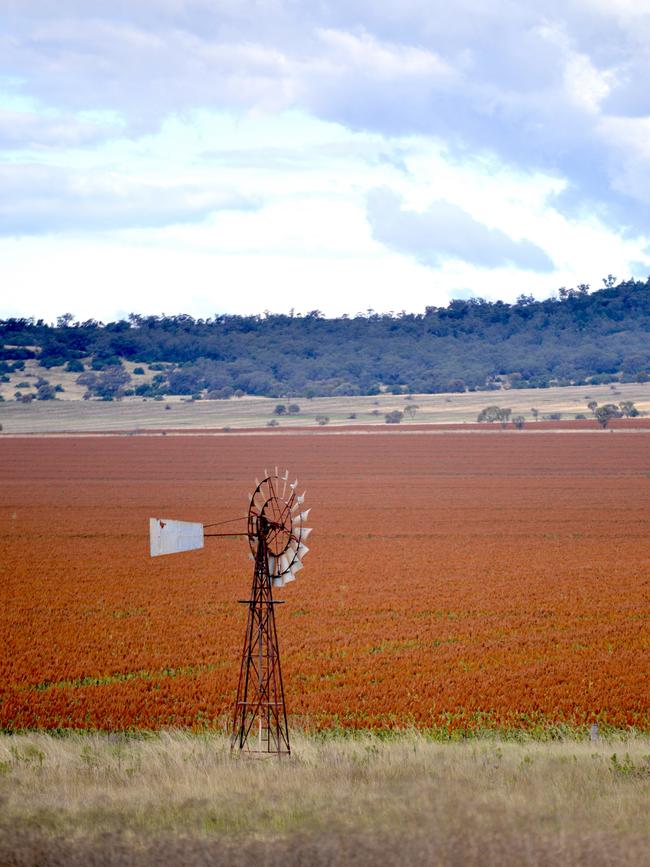

After decades of staid and stoic male presidents heading the once-powerful lobby group, Simson, 59, has been a breath of fresh air in both Canberra’s corridors of power and the country town halls where her farmer members spread across the nation meet.
“Fiona is a people person; everyone who meets her loves her,” says Tony Mahar, her loyal lieutenant and chief executive of the NFF for all of Simson’s seven-year reign.
“She’s a rock star; when we’re in the city, people stop her in the street and say ‘you’re that farming lady’ and want to talk to her about where their food comes from.
“One of her real achievements as president is that she has raised the profile of agriculture, agribusiness and farming across the board – with the public, the media, in politics and with Prime Ministers – and helped it be recognised as the dynamic, exciting, modern and $80 billion industry sector that it is.”
It’s a success story Fiona Simson is delighted to have been part of. As her time as head of the powerful farmer lobby group draws to a close – she is standing down as NFF president in October after having served on the farm advocacy group’s board for the maximum allowable term – Australia’s agricultural industry has never been in a stronger position.
It looks certain to become a $100 billion sector and one of the key drivers of the economy by the 2030 deadline laid out in the NFF Roadmap, devised by Simson early on in her term as NFF president.
Just as significantly, after farmers were noticeably absent a decade ago in early national debates about climate change, sustainability and carbon emissions, Simson has now managed to embed “the farmer’s voice” constructively into the heart of national policymaking.
It helped that her rise to prominence as an agripolitician – although Simson hates that term – had its roots back in environmental issues when her home of the Liverpool Plains with its fertile farms was, in 2006, threatened with being ripped apart by the arrival of coalmining.
As secretary of the local community group, the Caroona Coal Action Group, she helped fight BHP, the NSW government and the loathed Exploration Licence EL 965 – and won.
“I like being proactive and love supporting farmers, whether on the Liverpool Plains or Australia-wide and I’m a naturally positive person; so I kept putting my hand up,” says Simson, looking back on her rise to the top.
“We felt we were victims at Caroona; we were a conservative, law-abiding farming community that thought the laws of the land were fair and there to protect us, but we learnt the laws at that time weren’t fair because mining trumped agriculture. We were told to give up and sell up.”
No one likes an ultimatum or being bullied. A community blockade of the mine site and a noisy protest outside Sydney’s parliament followed, with Simson armed with a megaphone on the back of a truck, blonde curls in full flight.

As intended, the political and media spotlight immediately fell on the Liverpool Plains and its threatened underground water and farming families, with Simson and Caroona group president, local farmer and close friend Tim Duddy spearheading the fight.
Simson was then a mother of two young children, also ran farm business courses, was chair of the national Top Crop farm benchmarking group and helped husband Ed with work on their family farm near Premer, west of the small hamlet of Caroona.
In the long drawn-out battle over coal mining, in an effort to further the community’s push that agriculture on the Liverpool Plains be given priority over coal mining, Simson then also took up positions on the local Liverpool Plains shire council based in nearby Quirindi and, in 2008, somewhat reluctantly, filled a vacancy on the executive committee of the NSW Farmers organisation.
“What I learned (during that time) was that the answer to having a say and solving these problems is to be on the front foot, get involved, be positive and engaged – and to have a loud voice and a seat at the table if you really want to change the debate and the narrative,” she says.
By 2011, the Liverpool Plains coal fight was still waging and Simson, almost coming from nowhere, was elected the surprise president of NSW Farmers, in her continuing quest to save her treasured Liverpool Plains and other prime farmland from the encroachment of mining.
It was a controversial appointment, including to many farmers who were not used to having an outspoken woman with an environmental agenda as their head.
But Simson’s meteoric rise also marked a turnaround in the image and perception nationwide of farmer organisations as bastions of the National Party, filled with members staunchly opposed to progressive environmental and social issues.
“I certainly challenged the conservative reputation of NSW Farmers. Because of my stance (fighting the mining industry), I was seen by some as a left-leaning greenie,” admits Simson.
“But I view that badge with some pride, because these issues are so important. Farmers are not climate change denialists.
“I also think that I am one of the most apolitical people there is.”
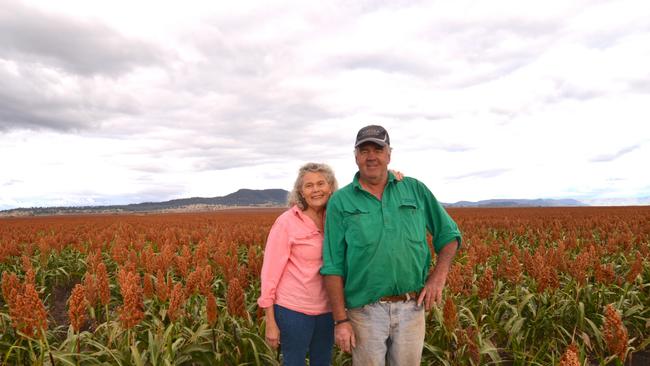
FAMILY TIES
It’s a cool autumn afternoon sitting in the meshed veranda wings of the gracious white farm homestead on The Plantation, where Fiona and Ed Simson live, 130km southwest of Tamworth.
With 60-year-old cockatoo Fred screeching obscenities from his corner of the leafy garden, a Zoom hook-up with her fellow directors on the NRMA Board just completed, two young grandchildren running in and out of the house, and sorghum harvest about to get under way out on the black soil paddocks stretching to the horizon, it’s a busy if normal day on the Simson farm.
Ed Simson, 62, is out checking the moisture in the soil and the new hi-tech spray drift weather monitor installed on his farm, to gauge if it is still too damp after recent rain to bring the lucrative harvest in, as sorghum prices hit record highs.
He describes the Liverpool Plains where his family have farmed since the 1880s – and at The Plantation since 1928 – as a magnificent part of the world, and a wonderful place to be a farmer.
Fiona, who met Ed at a mutual friends’ wedding when she was working in Sydney after finishing a business degree at Canberra University, says their home of more than three decades is close to nothing, but in the middle of everything.
“We fell madly in love,” she says of their early days, much of their courting done while Ed drove the tractor and she sat beside him, and endless weekends of driving between Sydney and Premer. “I always thought I was going to be a big career girl; now I couldn’t imagine living anywhere else,” Simson says, pondering the unexpected path her life has taken.
Stretching west of Tamworth and Quirindi and north to Gunnedah, the Liverpool Plains are five wide valleys filled with fertile black soil. “It’s just such great country,” says Ed, of the 6200-hectare family property where they grow winter wheat, summer sorghum, cotton and oat crops and fatten more than 500 cattle in the low hills.
While the property is looking verdant and the crops bountiful after three consecutive years of record rainfall, it hasn’t always been like that.
Between 2017 and the end of 2019 the Liverpool Plains, along with the rest of NSW, was deep in terrible drought.
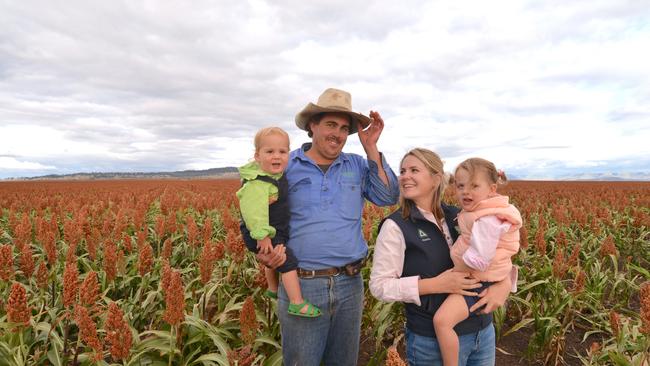
It hardly rained for three years. Not until one memorable weekend in October 2019, the day their son Tom, then 27, was getting married in the garden to English-born Georgina. Happy photos of the wedding party dancing in the welcome rain, white dresses fringed with mud, now line the walls of the homestead. “We couldn’t quite believe it,” Ed says, grinning.
“No rain for three years, then the one day we didn’t want it. No, actually I take that back; we were desperate for rain.
“Although the drought didn’t really break until the following February (2020), when Fi and Tony Mahar went on their Murray Darling drought tour.” An even wider smile breaks across his broad face.
It’s a time of change this year at the Simson farm. Partly because Fiona is finishing up as NFF president at the end of the year and will no longer be away for most of every week.
But a generational shift at The Plantation is also underway. From this year, it is no longer Ed running the large Liverpool Plains property where his family have farmed for nearly a century, and where he has held the fort while Fiona has spent much of the past decade at the helm of the NFF.
The past two years have marked the formal handover of the farm business by Ed and Fi – as they are known to all their friends – to son Tom, 30, his wife Georgina and their two children, Flossie, 3, and Wal, 18 months.
Next year, the young family will move into the sprawling main homestead that is the farm’s beating heart, instead of living seven kilometres down the road at the far end of the property. Fiona and Ed are planning to shift off the farm into a local regional town.
Simson is looking forward to spending more time with her daughter Jemima, who lives in the Hunter Valley with engineer husband Riley and their one-year-old daughter Vera. The couple both work in the coal mining industry. (The irony is not lost on any of the family.)
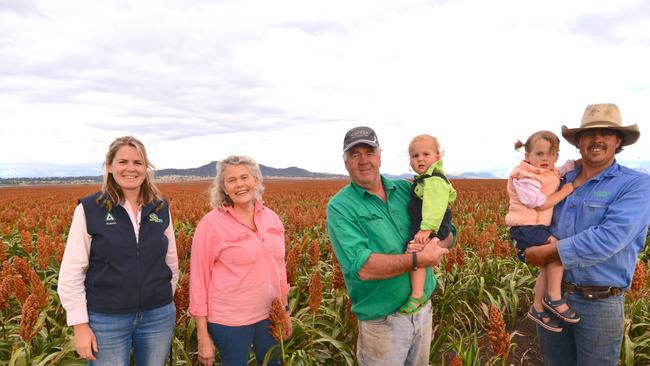
Simson is fiercely proud of both her children. And delighted with the way her family is handling the always-difficult task of farm succession planning and generational handover.
“It’s a huge issue for the industry, and I’m really pleased we are practising here what we preach,” says Simson, who grew up in the New England region near Armidale where her father managed a large sheep and cattle farm for the White family.
“We have been planning for this time since the day Ed and I were married; first (buying out) Ed’s family and then ever since our kids were born, we’ve been effectively planning for our own retirement off the farm.
“It’s never easy but we have talked often and early to our children about the future. Jemima loves the farm but she supports Tom making it his home. And Ed and I have a life to live away from the farm; we’ve always had a great partnership and I would never take on these roles without his support – but we are also very conscious that we never want to be those parents constantly back on the farm looking over Tom and Georgina’s shoulders.”
One of the biggest days in Fiona Simson’s large and colourful life came early late in March in New York.
At the end of a four-week NFF trip visiting farmers in Ireland, England and France, talking free trade deals in Europe and speaking centrestage on behalf of Australian farmers at the key United Nations Water Forum, Simson was booked to appear on a satellite link back to Australia.
There she was beamed on to the big screen in front of a packed assembly of the nation’s agribusiness movers and shakers in Sydney, to be awarded the top honour in Australian agriculture, the prestigious 2023 Rabobank Leadership Award.
It recognised the “vitally important” role Simson has played advocating on behalf of Australia’s agricultural sector, formulating the NFF’s 2030 Roadmap with its bold vision to grow agriculture to a farm gate output of more than $100 billion, and her importance as a role model for women in agriculture and diversity in leadership as the first female leader in the NFF’s 40-year history.
Rabobank’s Australian head Peter Knoblanche says Simson, in her time as NFF leader, has made one of the most fundamentally important contributions to leadership in the food and agribusiness sector in Australia ever.
The award also acknowledged Simson’s other, less well-known, contributions to agriculture, rural communities and international development, as chair of the Future Food Systems CRC, chair of the Australian Centre for International Agricultural Research and patron of the Gunnedah Gatepost Community Support Centre, all passions close to Simson’s heart.
Reflecting on the big award, Simson admits it seemed incredibly apposite, as well as humbling, to win such a respected accolade from one’s peers for her work as NFF president, at a time she was overseas looking at the challenges and opportunities for farmers at a global level.
She accepts that helping put the NFF Roadmap in place early on in her presidency, as well as restoring financial and constitutional stability to an organisation that had almost run off the rails, remain key achievements.
“It was a time when the ag industry needed leadership, and it wasn’t coming from government or the NFF at that stage (2016),” Simson says. “What the (80-page) Roadmap did, and what made it such a success, is that it showed the industry was taking charge of its own future.”
Within that blueprint were other goals that Simson has championed, dramatically changing the scope and ethos of what is relevant to the agricultural organisation she heads.
“On things like climate change, land and water use, biodiversity, women in agriculture, sustainability and trade, I just thought the NFF wasn’t stepping up in all the right places and needed leadership,” she says.
“It has proved to be a really good fit for me, and I would never have thought or said that at the start.”
Her achievements as NFF president are both dramatic, ongoing and trailblazing.
Encouraging kids from the city to look at careers, apprenticeships and jobs in agriculture. Promoting the thrilling rise of ag technology, attracting new types of younger, highly qualified employees to agriculture. Personally training and mentoring women to play a bigger role in agricultural leadership. Making regional Australia an important part of all national discussions, including about the housing crisis, employment, migration and decentralisation.
Attracting major corporate and agribusiness sponsors such Telstra and Nutrien to partner with the NFF on some of its key initiatives, thus increasing the NFF’s policy reach and reducing its reliance on membership fees to fund its activities, at a time when the number of primary producers had shrunk from 330,000 to less than 90,000 in the past 40 years.
And, of course, leading the way for the sector to become more involved at a policy and political level with the climate change, biodiversity, carbon credits and carbon emissions debate.
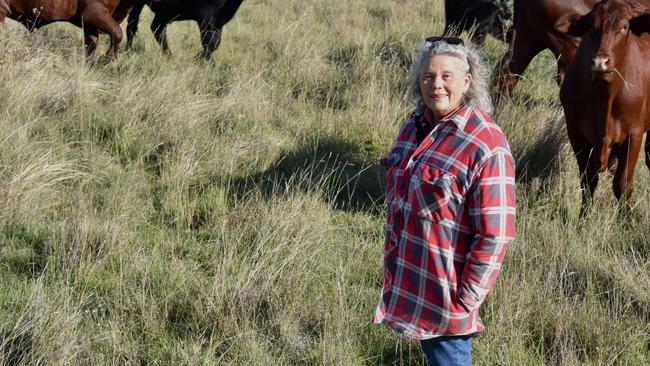
“We were late to the party on climate change,” says NFF CEO Tony Mahar.
“With her leadership the NFF really pivoted around sustainability and climate change because we knew farmers needed to be part of the conversation to help shape future policy; rather than either not having a position or being actively opposed (to climate change).”
He says that to dismiss the NFF’s Roadmap 2030 as a glib one-liner, or to categorise Simson’s presidency as all about media savviness and raising agriculture’s profile, is to miss the depth of detail, knowledge and solution-solving that underpins both.
“One of the unique abilities of Fiona is that while she’s personable, chatty and has a real capacity to open doors, she’s also a driver of issues, has the intelligence and knowledge to back it up, and has great insight into agriculture,” he says.
Back at the farm, as the sun glints off the red sorghum crop stretching to the foothills of Mount Tamarang, Simson – who is currently struggling physically as she waits for a double knee and a hip replacement as a consequence of a chronic arthritis condition – says she hopes she has made at least a small difference during her seven years as NFF president.
“It’s funny, I never set out to be NSW Farmers president or NFF president or any of these big roles I have; like most women I have the ‘impostor’ voice inside me and we are self-effacing and often underestimate our abilities,” she says. “But what I have learned, as I have progressively taken on these roles and responsibilities, and am exposed to new people, ideas and learnings, is you start to realise what you are good at, what you can achieve and when and where you can make a real difference.”
Once she steps down as NFF president, Simson intends to continue with her international roles on the incoming board of the World Farmers’ Organisation and as chair of the Australian Centre for International Agricultural Research.
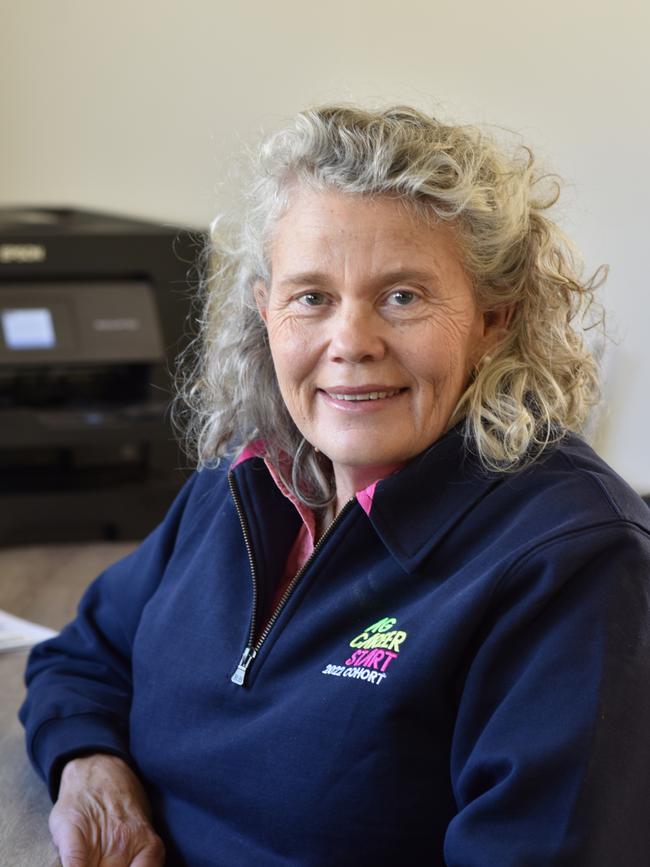
FIONA’S NEXT BIG STEP
Despite her NFF presidency ending in October, Fiona Simson is not intending to take a back seat on hot-button agricultural issues any time soon.
But Australian politics is firmly off the agenda.
This time her horizons are the global agricultural stage, with plans to soon take a seat on the six-member board of the World Farmers’ Organisation, representing all farmers in Australia, New Zealand and the wider Oceania region.
The NFF, as a member of the World Farmers Organisation, has nominated Simson to be appointed to the WFO board to represent Australian farmers.
As the likely next Oceania board member, she will replace former NZ Farmers Federation president and WFO vice-president Katie Milne, who is retiring after serving her maximum term.
“So many of the issues we as Australian farmers are dealing with are global ones, where international bodies, governments, global activist groups and large corporates are setting the agenda and driving policy outcomes,” says Simson, who is expected to be elected to the WFO Board at its annual general assembly meeting in South Africa May 21-24.
“This (nomination) shows the NFF has recognised the amount of global policy that is influencing what happens in agriculture and agribusiness in Australia, both on the farm and right through the food chain to consumers, and wants to be involved.”
Simson says Europe, in particular, is driving these policy outcomes that affect all Australian farmers, yet don’t always fit or aren’t relevant to Australian farming systems. Important debates centre on contentious issues such as animal welfare standards, the switch from meat and livestock to plant proteins, sustainable water use, chemicals, carbon accounting, climate change, environmental issues and sustainability.
Simson says too often it is activist agendas that are taking the lead in these discussions; making it vital Australia steps up its role in the international arena.
“If we want to influence these debates, and not just be at the receiving end of their outcomes, which have the potential to impact every farmer and agribusiness in Australia, we must be sitting at the table where these agendas are discussed, issues debated and global polices formulated,” says a determined Simson.



